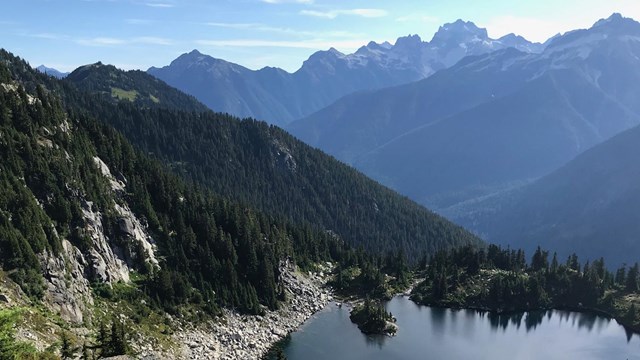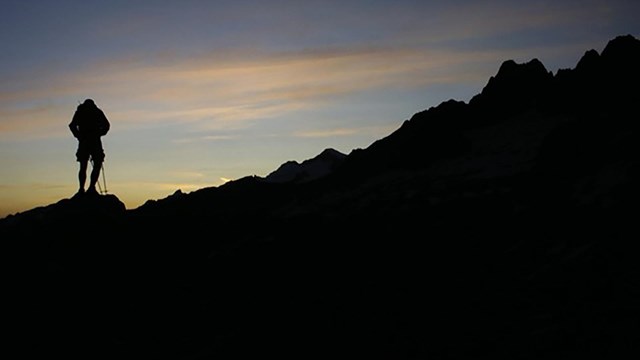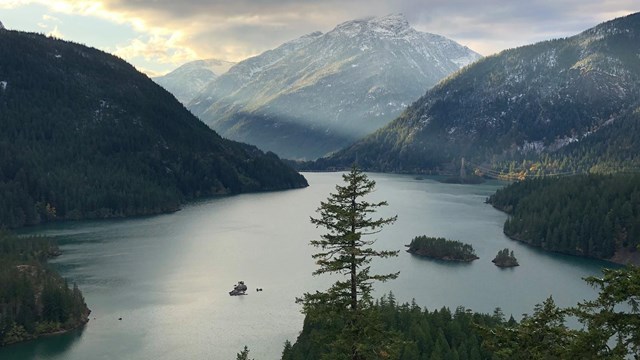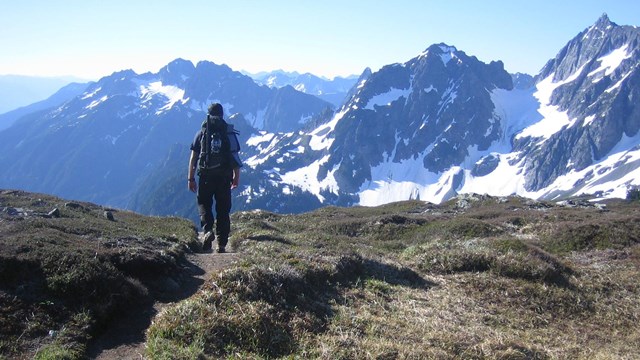
The Wilderness Information Center in Marblemount will be closed starting October 12th, but backcountry permits are required year round. Winter Permits Follow the steps below to submit a permit.
Watch a mandatory video about park rules and regulations, Leave No Trace principles and safety.
-PERMITS ARE REQUIRED and valid only for the trip leader, number of people, and sites/dates listed. Your group must follow this itinerary! -KNOW AND FOLLOW ALL PARTY SIZE LIMITS: 12 pairs of eyes (people + stock) in all trailed areas and around the Boston Basin, Eldorado, and Sulphide Glacier Cross Country Zones; 6 in all other areas. -CAMP ONLY IN DESIGNATED SITES along trail corridors. -IN CROSS-COUNTRY ZONES camp on snow, rock, or bare ground. Avoid vegetation and water. -STORE FOOD PROPERLY at all times. Hang food and scented items at least 12 feet up, 5 feet out from any tree limb, or use a food canister or box. -MINIMIZE CAMPFIRE IMPACTS — Use a stove instead. Where allowed, use established campfire rings only, and burn only small, dead and downed wood. Campfires are prohibited in all cross-country zones. Never burn trash. -PROPERLY DISPOSE OF WASTE — Use toilets where provided; if no toilets are provided, dig a cathole in organic soil. On rock, snow or ice, pack out human waste. Pack out all garbage—never burn it! -LEAVE WHAT YOU FIND — Leave all natural and cultural objects as you found them. -PETS are not allowed in the National Park (except on the Pacific Crest Trail). Leashed dogs allowed in the Recreation Areas. -STOCK PACKERS must use stock trails and camps. No grazing in the National Park, grazing permit required for Recreation Areas where allowed. -HUNTING / FISHING must follow state regulations and require a valid WA license. Hunting prohibited in National Park. Check for camp and trail closures on our Trail Conditions page or Recreation.gov, then plan your itinerary using the Wilderness Trip Planner.
Fill out the form below. (To copy, select the content in the box below, right click and select "Copy".)
Your submission of the email is sufficient during the winter season (October 12 - May reopening.) Ranger follow up is not needed, we will enter your permit into Recreation.gov. | |
Where to Pick up a PermitThese locations are only open during the summer: Operating Hours and Seasons. 7280 Ranger Station Road, Marblemount WA 98267
This center is the main backcountry permit office for the park complex. Wilderness rangers are on hand to provide firsthand trip planning advice for all wilderness and backcountry areas of the park, including Ross Lake and climbing areas. You'll also find current trail and camp conditions, maps, and more to assist with your trip planning. All permits for Cascade River Road trailheads (including Cascade Pass, Boston Basin) must be picked up in person in Marblemount. 10091 Mt. Baker Hwy, Glacier, WA 98244
This is a U.S. Forest Service ranger station that is jointly staffed by National Park Service wilderness rangers during the summer season. Backpackers and climbers can pick up backcountry permits required for trailheads along the Mt. Baker Highway, such as the Fisher Chimney’s route on Mt. Shuksan, the Chilliwack River drainage, or Copper Ridge. Permits for trips starting at the Copper Ridge and Chilliwack area can be picked up in person when the Glacier Public Service Center is open. Contact noca_wilderness@nps.gov for permit questions. Priority for walk-up permits will be given to in-person visitors at permit issuing stations. Rangers may issue walk-up permits via email for the following areas, subject to current conditions, availability, and closures:
Backcountry areas accessed from:

Wilderness Trip Planner
Plan a trip into the backcountry of the North Cascades. 
Backcountry Reservations
Reservations for backcountry permits begin in March 2025. 
Conditions
Learn about current conditions for roads, trails, lakes, and more. 
Hiking Safety
Plan on hitting the trail? Be prepared! Are you a thru-hiker?Beginning in 2020, North Cascades National Park will honor the long-distance Pacific Crest Trail (PCT) hiking permit issued by the Pacific Crest Trail Association (PCTA) for camping at specific camps. PCTA long-distance permit holders no longer need to obtain an overnight backcountry camping permit for Six Mile Camp and Bridge Creek Camp within North Cascades National Park. 
Permits Are LimitedTo protect the wilderness and visitors’ experiences, the number of permits issued for each area is limited. Popular areas such as Cascade Pass, Ross Lake, Copper Ridge, and Thornton Lakes can be very busy during the height of summer, and permits can fill quickly. The busiest climbing areas are Sulphide Glacier, Boston Basin, and Eldorado cross-country zones. To maximize your chance of obtaining a permit and finding solitude, visit these areas midweek or after Labor Day, and have a backup itinerary or climb in mind if your first-choice area is already full. Ask a ranger for less busy alternative areas to visit. There is always somewhere to go. Why do I need a permit?Backcountry permits protect your wilderness experience and prevent overcrowding at camps or climbing routes, provide for opportunities for solitude and a quality backcountry experience, and protect natural resources so that all visitors – including future generations – can enjoy them. Permits also serve an important safety function in the event of an emergency or wildfire, and allow park managers to gather data important for planning and decision making. Thanks for doing your part to help steward these important wilderness resources. |
Last updated: November 20, 2025
